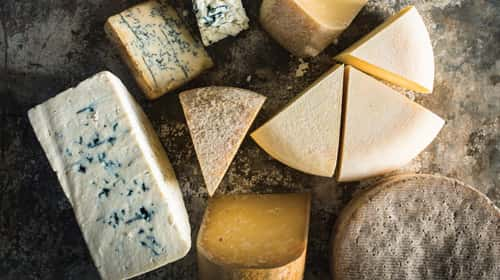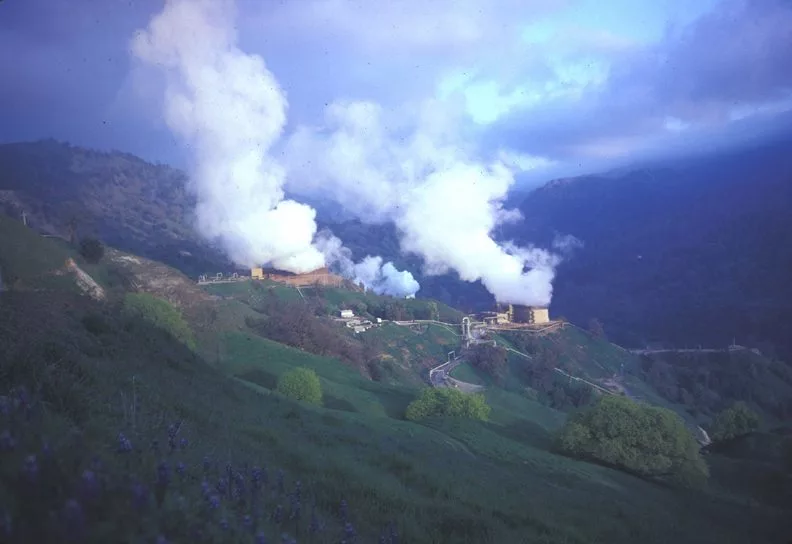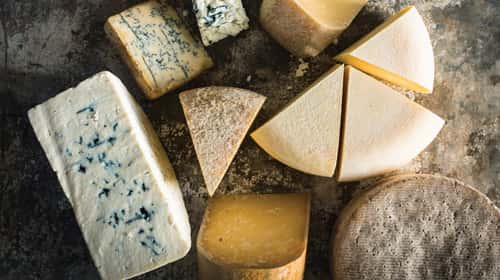 While California is known worldwide for its wine, in recent years it has gained increasing attention for its cheese. Claiming to be “America’s Dairyland,” Wisconsin proudly led the dairy industry for years, placing California in the number two spot. In 1994, the torch was passed. California along with our happy Holstein cows obtained the number one spot in dairy production, to become an artisanal cheese haven undoubtedly on the rise. Here’s a look at a few of the local cheese companies along the North Bay cheese trail.
While California is known worldwide for its wine, in recent years it has gained increasing attention for its cheese. Claiming to be “America’s Dairyland,” Wisconsin proudly led the dairy industry for years, placing California in the number two spot. In 1994, the torch was passed. California along with our happy Holstein cows obtained the number one spot in dairy production, to become an artisanal cheese haven undoubtedly on the rise. Here’s a look at a few of the local cheese companies along the North Bay cheese trail.
Point Reyes Farmestead Cheese Company
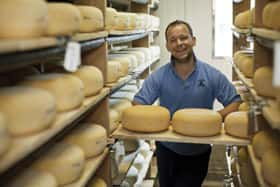 The Robert Giacomini Dairy, home of Point Reyes Farmstead Cheese Company, began in 1959, when Bob and Dean Giacomini purchased 720 acres with 100 Holsteins. For 41 years, they ran the dairy and sold the milk to a local creamery processor. Then, in the late ‘90s, their daughters, Karen, Diana, Lynn and Jill Giacomini, wrote a business plan to make and sell cheese so they could keep the farm productive as they gradually took the farm over.
The Robert Giacomini Dairy, home of Point Reyes Farmstead Cheese Company, began in 1959, when Bob and Dean Giacomini purchased 720 acres with 100 Holsteins. For 41 years, they ran the dairy and sold the milk to a local creamery processor. Then, in the late ‘90s, their daughters, Karen, Diana, Lynn and Jill Giacomini, wrote a business plan to make and sell cheese so they could keep the farm productive as they gradually took the farm over.
According to Jill Giacomini, there was a burgeoning opportunity in artisan cheeses at the time, and those around them were enthusiastic and supportive about their new endeavor. Other established cheese companies, like Cowgirl Creamery and Redwood Hill Farm, became their mentors and were excited for them to join.
“We were in a great space, with a lot of opportunity to differentiate from those around us,” she says. “We wanted to make sure we were different. No one else here was making blue cheese, so that’s what we did.” They wrote the business plan and launched the company with their first vat of Original Blue in August 2000. They slowly added to the product line with Toma, Mozzarella, Gouda, Bay Blue and White Cheddar, among others. Their farm milks about 430 cows and has another 300 to 400 at any given time that are being raised on the farm, which sits alongside Tomales Bay just north of Point Reyes Station.
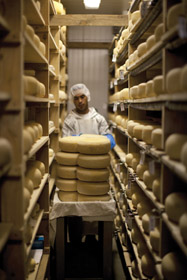 “We’re now using all of our milk for our cheese in addition to being farmstead and having total control of our finished product starting with the pastures our cows graze on,” she says. “What sets us apart in the marketplace is our commitment to trade and consumer education. Nothing makes us happier than sharing our story and sustainable farming practices with our customers while they’re visiting us at the farm.”
“We’re now using all of our milk for our cheese in addition to being farmstead and having total control of our finished product starting with the pastures our cows graze on,” she says. “What sets us apart in the marketplace is our commitment to trade and consumer education. Nothing makes us happier than sharing our story and sustainable farming practices with our customers while they’re visiting us at the farm.”
True to form, they opened their culinary educational center, The Fork, in 2010. It offers a wide range of educational events, from hands-on and demo-style cooking classes, to farm tours and cheese tastings, to public and private farm-to-table dinners.
“What makes our cheese so special? It’s the milk,” says Giacomini. “The high quality milk represents this farm and this region. If we do our job right, our cheese tastes like our milk.”
Nicasio Valley Cheese Company
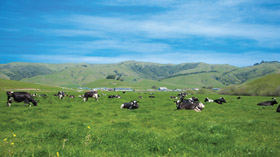 Located on Nicasio Valley Road, Nicasio Valley Cheese Company has been in the dairy business in West Marin since 1919. Their grandfather, Fredolino Lafranchi, immigrated to America from Maggia, Switzerland, with the desire to own and operate his own dairy. He raised his children on the ranch, and his eldest son, Will, continued the family business.
Located on Nicasio Valley Road, Nicasio Valley Cheese Company has been in the dairy business in West Marin since 1919. Their grandfather, Fredolino Lafranchi, immigrated to America from Maggia, Switzerland, with the desire to own and operate his own dairy. He raised his children on the ranch, and his eldest son, Will, continued the family business.
Today, his children run the business. Rick Lafranchi, the second oldest of his six siblings, is in charge of sales and marketing for the company. Exploring their late fathers’ wishes of making cheese in the style of his ancestral home in Switzerland, the siblings started making cheese with Swiss master cheesemaker, Mairizio Lorenzetti in 2007. Lorenzetti showed them the art of cheesemaking and in 2010, the Nicasio Valley Cheese Company was established. They now offer ten different cheeses, all based on recipes they learned.
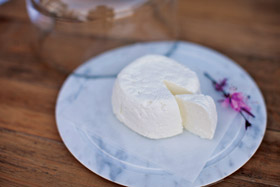 Nicasio Valley Cheese Company sells direct to local grocery stores, including Oliver’s, United and Molly Stones. They found the local community to be very supportive, and Foggy Morning quickly became the company’s most popular cheese. As the only organic farmstead cow’s milk cheese maker in California, they make all their cheeses with their own milk. “It’s hard to get milk any fresher,” says Lafranchi. “We finish milking at 7 a.m. By 9 a.m. the milk is in the vat and the cheese making process has begun.” They are also partnered with Clover-Stornetta, which has the highest milk quality standards in the industry. “We’re honored to be a part of that group,” says Lafranchi. “Clover-Stornetta inspires us to be the best possible producer we can be.”
Nicasio Valley Cheese Company sells direct to local grocery stores, including Oliver’s, United and Molly Stones. They found the local community to be very supportive, and Foggy Morning quickly became the company’s most popular cheese. As the only organic farmstead cow’s milk cheese maker in California, they make all their cheeses with their own milk. “It’s hard to get milk any fresher,” says Lafranchi. “We finish milking at 7 a.m. By 9 a.m. the milk is in the vat and the cheese making process has begun.” They are also partnered with Clover-Stornetta, which has the highest milk quality standards in the industry. “We’re honored to be a part of that group,” says Lafranchi. “Clover-Stornetta inspires us to be the best possible producer we can be.”
Marin French Cheese
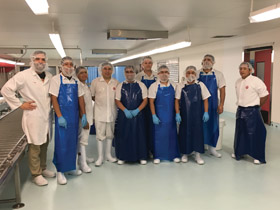 Marin French Cheese is a familiar name to many in the North Bay. But what’s not as well known is how far back the company’s history goes. Founded in 1865 by Jefferson Thompson at his dairy farm in West Marin, the company became well known for its European style cheeses. Having operated in the same location for more than 150 years, Marin French Cheese holds the distinction of being the longest continually operating cheese company in North America.
Marin French Cheese is a familiar name to many in the North Bay. But what’s not as well known is how far back the company’s history goes. Founded in 1865 by Jefferson Thompson at his dairy farm in West Marin, the company became well known for its European style cheeses. Having operated in the same location for more than 150 years, Marin French Cheese holds the distinction of being the longest continually operating cheese company in North America.
The Thompson family eventually sold the company in 1995, and eventually found its new home with Rians, the respected French family of cheese producers that also owns Laura Chenel’s Chevre in Sonoma. The company still creates the same classic style of Brie and Camembert that it was founded on, using only the freshest milk from neighboring family dairies. Their unique Petite Collection, which includes seven varieties of four-ounce wheels, has become popular and is what distinguishes Marin French Cheese from other Brie producers.
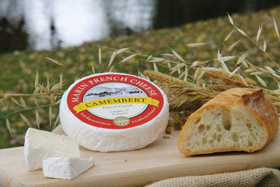 Marketing Director Elyzabeth Dehapiot attributes the quality of ingredients and the cheesemaker’s technique to their success. The company’s Petit Breakfast cheese has been around for more than 150 years and still sells today. The only change is an extra dollop of cream added since its origin. “Similar to winemaking, in which the terroir is fundamental, our cheeses have a distinctly coastal California character and flavor,” says Dehapiot.
Marketing Director Elyzabeth Dehapiot attributes the quality of ingredients and the cheesemaker’s technique to their success. The company’s Petit Breakfast cheese has been around for more than 150 years and still sells today. The only change is an extra dollop of cream added since its origin. “Similar to winemaking, in which the terroir is fundamental, our cheeses have a distinctly coastal California character and flavor,” says Dehapiot.
Launching new food-service products, Marin French collaborates with chefs and other professionals to adapt products for their needs. They’re also preparing to celebrate their third annual picnic on the grounds of the cheese factory in September.
Vella Cheese Company
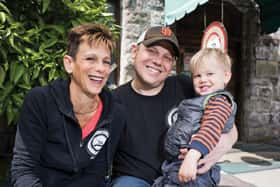 The roots of Vella Cheese Company go back several generations. Tom Vella arrived in Sonoma from Sicily in 1922 where he began building the foundation for his future in cheese. In 1949, after years of working with different cheese companies, Vella began the Vella Cheese Company in 1949.
The roots of Vella Cheese Company go back several generations. Tom Vella arrived in Sonoma from Sicily in 1922 where he began building the foundation for his future in cheese. In 1949, after years of working with different cheese companies, Vella began the Vella Cheese Company in 1949.
In the 80s, the next generation of Vellas came on board to expand the family business and variety of cheeses to reach a larger audience. The worldwide popularity of their flagship product, Dry Jack, was created. Today, after 85 years, the third and fourth generations of the Vella Cheese family continue the tradition of small batch, high quality artisan cheese.
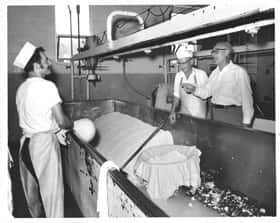 “We make our Monterey Jack cheese using the same recipe and technique from 1931,” says Chickie Vella, facilities manager. The company makes three different versions of the Monterey Jack as well as other Italian-style cheeses: Asiago, Romanello and Toma, among others.
“We make our Monterey Jack cheese using the same recipe and technique from 1931,” says Chickie Vella, facilities manager. The company makes three different versions of the Monterey Jack as well as other Italian-style cheeses: Asiago, Romanello and Toma, among others.
“All our cheeses are made by hand, with milk from a dairy just a few miles away,” says Vella. “We’ve always been a family-run company with a small, caring workforce. Quality and consistency have been the keys to our success.”
Fourth generation cheesemaker Gabriel Luddy, enjoys carrying on the family legacy. “It was my great-grandfather’s vision to have the business passed down through five generations,” he says. “I was lucky enough to work closely with my grandfather, Ig Vella, for more than 10 years. He taught me a lot about the cheesemaking business and would still come hand-roll the first vat of Dry Jack with us.”
Achadinha Cheese Company
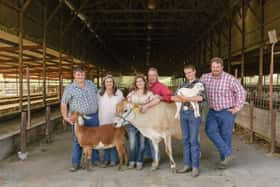 The Achadinha Cheese Company has been involved in the dairy business for three generations, beginning in Portugal with the Pacheco family. Based out of Petaluma, the company includes 200 goats and 60 cows. Both varieties of milk are used to blend their cheeses. They feature Capricious, Broncha, Feta, Fromage Blanc, Butter and Kefir. Capricious and Chevre are produced when there’s enough goats’ milk. “Due to the crazy weather this past year, we have had very little goats milk, as we work with their natural cycle,” says Donna Pacheco, co-owner of Achadinha Cheese Company.
The Achadinha Cheese Company has been involved in the dairy business for three generations, beginning in Portugal with the Pacheco family. Based out of Petaluma, the company includes 200 goats and 60 cows. Both varieties of milk are used to blend their cheeses. They feature Capricious, Broncha, Feta, Fromage Blanc, Butter and Kefir. Capricious and Chevre are produced when there’s enough goats’ milk. “Due to the crazy weather this past year, we have had very little goats milk, as we work with their natural cycle,” says Donna Pacheco, co-owner of Achadinha Cheese Company.
“What makes our product special is how the ‘girls’ are treated and fed,” says Pacheco. “We don’t feed them corn, or use hormone or pesticides on the property. We pasture [the animals] all year long, and we feed them brewer’s grain from Bear Republic and Russian River Brewery.”
After they make the cheese, the animals are given whey with Kombucha scoby, to give them probiotics. “We do supplement with oat and alfalfa hay as well,” says Pacheco. “But during the drought the last few years, and now the excess rain, the price of organic hay has been high.”
Pacheco encourages people to know where their food is produced, and to visit them on their farm. “We give tours regularly and also have cheesemaking classes, all by appointment,” she says.
A “grate” future for cheese
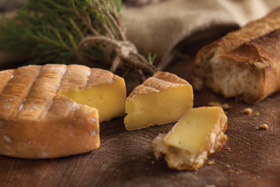 Sales in the natural and specialty cheese market are expected to reach $19 billion in 2018, a record high for the industry. As California continues to lead the country in cheese and dairy production, what does this mean for our local, sustainable dairy farms that strive to remain on the forefront of a growing industry?
Sales in the natural and specialty cheese market are expected to reach $19 billion in 2018, a record high for the industry. As California continues to lead the country in cheese and dairy production, what does this mean for our local, sustainable dairy farms that strive to remain on the forefront of a growing industry?
Giacomini recognizes that changes are on the horizon for the cheese industry. “We’ve been doing this since 2000, and there’s much more saturation now. There are so many more artisan cheese companies, and that makes our industry so excited,” she says. “With all these new cheeses, it makes the American original cheeses more of a category on the world stage, not just the old world cheeses.”
To ensure a future and remain mindful of their legacy, Nicasio Valley Cheese Company plans to balance both future and past, remaining present. “To ensure our future, we went back to our past,” says Lafranchi. “We’ve met a lot of wonderful people, and are committed to protecting that legacy.” Pacheco adds, “We see the dairy industry disappearing in our area due to the lack of sustainability.”
According to Dehapiot, the cheese industry has matured, with European-style cheeses being more popular and prevalent than ever. Check out the artisanal treasures for yourself. You may fall even more in love with cheese in the North Bay.


